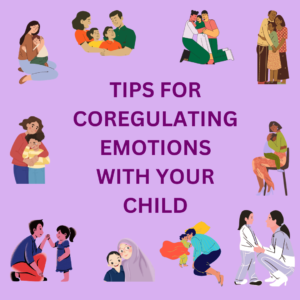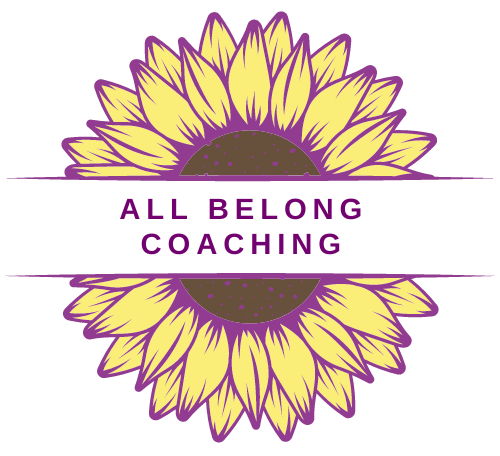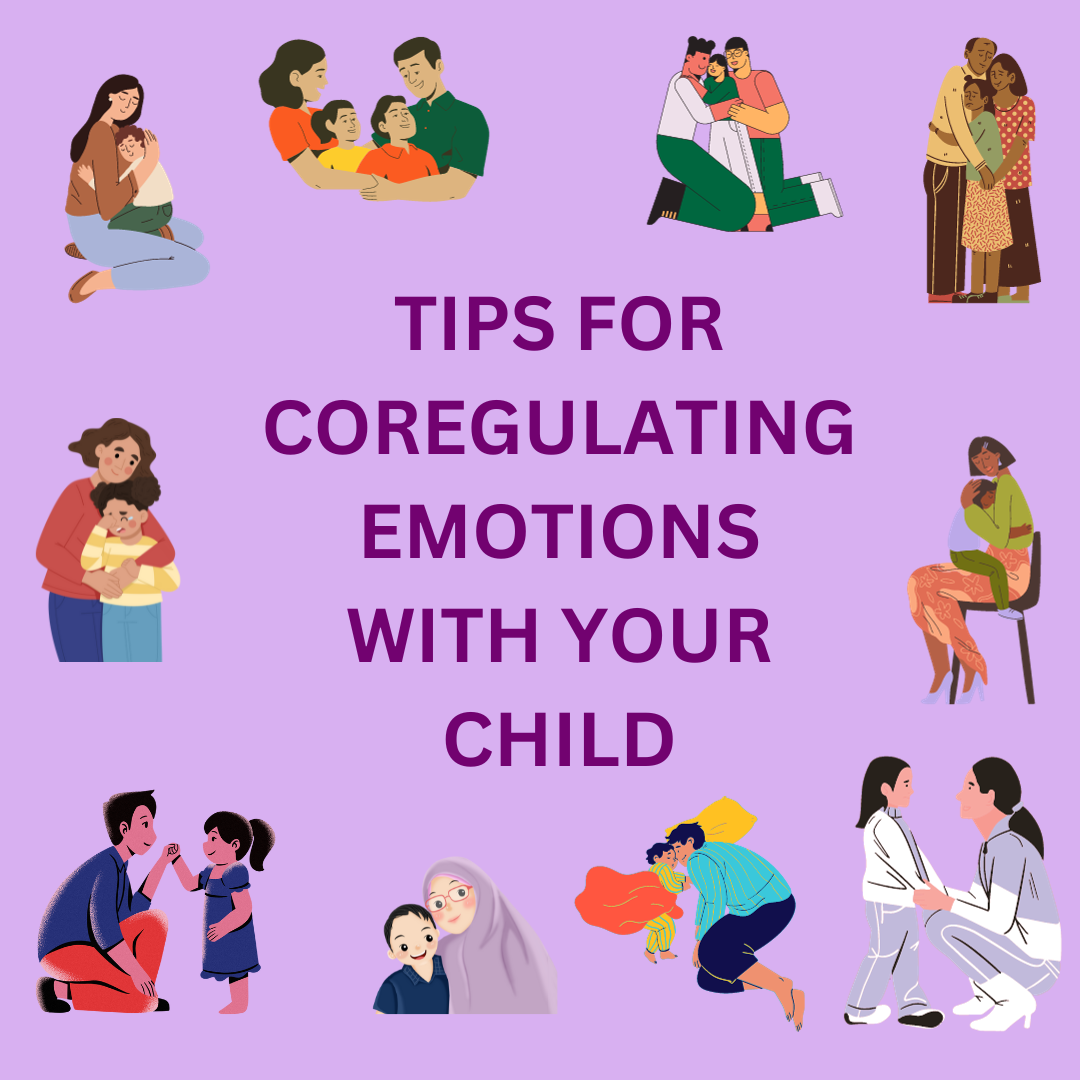CoRegulating Emotions With Your Child – A few tips
Last Month I dropped a blog entry about coregulating emotions with your child who has ADHD. I discussed what that is and why it is important. You can read that blog post HERE if you missed it.
I promised to bring you some tips this month about the how-tos of coregulating emotions with your child with ADHD. As promised – here are some tips!

Here’s A Few Tips

Be Educated and Challenge Your Thinking
- In order to understand what is going on in your child’s brain, you must become educated about ADHD and it’s neurological impacts on the brain, as well as how it may delay the development of emotional regulation skills, among others.
- In addition to getting the education you need, you may need to shift your expectations, and challenge your thinking. Parents often think, “my child is 8, she *should* be able to do the thing.” But sometimes we forget that our kids with ADHD can be up to 30% behind their neurotypical peers in certain skills, so reminding ourselves that chronological age does not always reflect the child’s current capabilities.
- Shift your thinking away from “My child is giving me a hard time” to “My child is HAVING a hard time” and you may find yourself feeling calmer.

Pause and Breathe
- This is especially important if your child is feeling big feelings. Tantrums, explosive outbursts, crying fits, fits of tears, and even intense positive feelings. Pause before reacting.
- Take a moment to breathe. Co-regulation starts with a calm caregiver. Center yourself, breathe, and remind yourself that you have to be the calm your child needs.
- Pay Attention to Your Physical Presence – you want your body language to be open and non-threatening. Sometimes you may need to sit near your child to appear less intimidating. Often for younger children it may help to get down to eye level with them.

Validate all Emotions and Use Reflective Language
- Name and validate the child’s feelings, no matter what the behavior is, or how disproportionate to the situation.
- Empathize with your child’s point of view. Do not try to tell the child why they should not feel that way. All feelings are okay feelings.
- Use reflective language. Try to use the language that your child uses, and get curious to ask questions IF your child is open to that. Be sensitive to perceived criticism or rejection.

Model Regulation Skills
- Children, with or without neurodiverse brains, are not born with the ability to regulate our emotions. We learn them. The best place to learn them is from watching our caregivers and parents.
- Talk out loud to your child about your own emotions and what you feel in your body. For example, “I feel like my shoulders are tense when we do math homework – I’m going to stretch my muscles, would you like to stretch with me?”
- Share examples of how you are regulating emotions with your child on a day to day basis. Allowing them to see how you handle every day situations gives them something to start from.

Create Spaces and Systems to Teach Emotions, and Reset Options
- For younger children, use charts and visuals of several types to help your child learn to identify their feelings, what their bodies feel like, what they need, and/or what they could do to feel better. Keep it in a visual space and use it often.
- Show children how to do self-body-scans. Teach them to notice their breathing, are they hungry? Tired? Do they need the bathroom? Are they in pain? Talk about feelings regularly not only when big feelings appear.
- Create Re-set options WITH your child. Make a list of things that your child identifies as things that can help them feel better, less angry, etc. Provide a safe space that has things that soothe your child’s senses. Allow your child to ask to take a break, to reset, or to express how they are feeling in another way (music, coloring, listen to music, etc)

Teach Wellness, Mindfulness and Grounding Techniques
- For children getting a little older, they can begin to learn mindfulness and grounding techniques that may help them with emotional regulation. Deep breathing, journaling, gratitude practices, stretching, yoga, etc. are all skills that older kids can begin to explore to find which things work for them.
- In age appropriate manners, teach about the core four and how they impact your brain’s function, including emotional regulation. (Core four – hydration, nourishment, rest, and movement – see more HERE).
- Encourage your child to learn about self care, and practice it with them. Teach your child how toask for their needs including the need to rest, reduce sensory input, and have fun.

Remember It Does Not Have To Be Perfect
- This can all be easier said than do, I know. These are goals, meant to assist and guide. NOT to give you something to feel guilty about if you don’t do it “perfectly.”
- No one I’ve met in my life has had perfect record of emotional regulation. We lose our tempers, we get scared, we over-react, we act when tired or hungry or while distracted. When all that happens, we are less able to model the skills we are struggling with at that moment. It’s okay. Progress is far more important than perfection.
- If you acknowledge your own difficulties, it humanizes you to your children. Learn to talk to your child about your own mistakes, “I’m sorry – I was very tired and didn’t listen to my body and I yelled. I will try to listen to my body in the future. How do you know in your body when you are tired?”

A Final Note
If you have a child with ADHD who is complex – who has explosive behavior, you may be reading this blog and going “none of that will work for me.” And you are most likely correct – for the moment. For right now. It’s hard to do any of this stuff when you are in the middle of the chaotic storm.
In the middle of the storm – if there are doors slamming, angry words flying, tantrums being had – focus on the early steps. Be calm. Breathe. Model. Prioritize Safety. And know that you are not alone, you are not a bad parent, and you are exactly the parent your child needs.
These steps will work for more complex kids, but you have to do it a step at a time. Reach out for help if you need it – from a coach (myself or otherwise), from a therapist, a medication provider, etc. It can be tougher to find resources and support when your child struggles with emotions. Be kind to yourself. Give yourself some grace.

🌻 Don’t Delay Joy 🌻
Kat Sweeney, MCLC
I love to work with parents of ADHD Kids because I *was* a parent with ADHD kids, and before that I was the KID with ADHD. I know how much of a struggle it can be for both child and parent. I also know that finding the right resources can be challenging, and advice is often conflicting. I meet you and/or your child where you are. No judgement. Totally inclusive, Safe Space. If you’d like to learn more about working with me, book your FREE discovery session today!
Book Your FREE Discover Session Today


1 comment